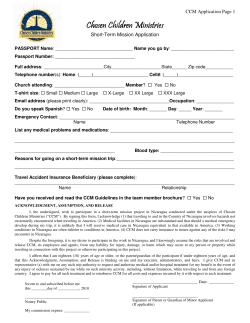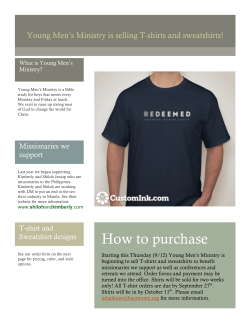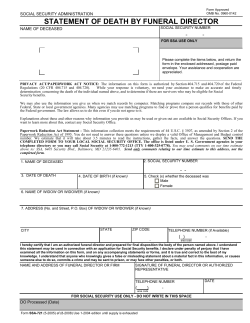
Objectives Managing Community Resources for TBI Survivors Managing Community Resources
Managing Community Resources for TBI Survivors Kimberly S. Gully, MS, CCC, CCM, CBIST Objectives Managing Community Resources for TBI Survivors • Share resources to help brain injury survivors from the onset of coma to returning to their community Kim Gully, MS, CCC, CCM, CBIST Rehab Without Walls, Southern California Executive Director kimberly.gully@rescare.com 800.741.1164 ext. 222 – – – – – – – quality of life and inclusion social support transportation/driving life skills fitness/ leisure education and continued learning financial resources How to Use this Info Core Concept This material is designed to give an overview of the selected categories with ideas for how to identify and locate resources appropriate for the survivor according to their individual needs. Including an individual into a community, family, work site, school, etc. is the overarching goal of the rehabilitation process. The information includes useful resources that provide global information on a broad range of topics related to traumatic brain injury as well as useful links to related information. 3 Our society has a tendency to sort people by likeness and exclude those who are different. This is where the concept of “inclusion” is critical to embrace. 4 Managing Community Resources for TBI Survivors Kimberly S. Gully, MS, CCC, CCM, CBIST Inclusion Helping Survivors & Families • Navigating through the complex course of traumatic brain injury is a daunting process • Families and survivors are faced with many overwhelming situations • Identifying resources is a service we as professions provide • Share the info, having a resource for later is just as important as immediate needs “Inclusion brings people to the community regardless of their differences. It does not try to change or alter differences against the person’s will or capacity. It does not try to create forced similarity. Inclusion respects differences, honors diversity, and invites full community participation. It is a term that implies a welcome to all.” From The Essential Brain Injury Guide, Edition 4.0, Brain Injury Association of America, 2007 Review of the Literature 5 Kim’s Top 10 Websites (That you May or May Not Know About) • Brain Injury Portal – www.northeastcenter.com • Brain Injury Resource Center ‐ www.headinjury.com • Brain Trauma Foundation ‐ www.braintrauma.org • Defense & Veterans Brain Injury Center ‐ www.dvbic.org • Disability Resources ‐ www.disabilityresources.org • Learn Net – www.projectlearnet.org • Preventing, Treating & Living with TBI ‐ www.brainline.org • TBI Survival Guide ‐ www.tbiguide.com • Understanding Brain Injury – A Guide for the Family http://mayoresearch.mayo.edu/mayo/research/tbims/upload/ubi_families.pdf • While you are Waiting ‐ http://waiting.com/comawaiting.html http://www.thebarrow.org/Education_And_Resources/Barrow_Quarterly/205271 Managing Community Resources for TBI Survivors Kimberly S. Gully, MS, CCC, CCM, CBIST Living with Brain Injury www.biaa.org www.passitoncenter.org • 4 Centers in Southern Ca – ATEC (Assistive Technology Exchange Center) Santa Ana • www.atec‐oc.org • Serves Orange, Riverside, San Bernardino, LA and San Diego Counties – Dayle McIntosh Center – Garden Grove • www.daylemc.org – Independent Living Resource Center, Inc – Santa Barbara • www.ilrc‐trico.org – Free Loan of Durable Medical Equipment – Pasadena • http://cas1.org • San Gabriel Valley ‐ to include Glendale and Burbank Social Support • • • • • • • • • • • • Alternative Medicines Assistive Technology Behaviors Caregiver/Family Stress Depression Driving Employment Falls Fatigue Financial Issues Children and Brain Injury College/Return to School • • • • • • • • • • • • • • Headaches Legal Issues Medications Pain Research/Clinical Trials Seizures Severe Brain Injury Sexuality Sleep Spasticity Speech/Communication Substance Abuse Taste and Smell Vision Where to locate Support Post injury isolation from family, friends, work associates and social networks is a reality for many brain injury survivors. Finding a support group to assist the survivor and the family cope with the changes in their lives through local hospitals, rehabilitation centers and by seeking out professional input from a therapist specializing in traumatic brain injury is highly recommended. 11 • Brain Injury Association of America – www.biausa.org • The Social Support Network for TBI – www.wearetbi.org Managing Community Resources for TBI Survivors Kimberly S. Gully, MS, CCC, CCM, CBIST Career Options • Returning to the work force for many who are recovering from a brain injury is challenging • Resources to help you discover career opportunities of interest and how to move towards those goals are included www.onetonline.org Content Model ‐ Anatomy of an occupation Taxonomy ‐ A spectrum of occupations Data Collection ‐ Real‐world information Career Exploration ‐ Tools Professional assessment instruments • My Next Move ‐ Get started on a new career – Online Interest Profiler – can be used to determine interest levels in general • • • • Managing Community Resources for TBI Survivors Kimberly S. Gully, MS, CCC, CCM, CBIST www.onetonline.org/skills Managing Community Resources for TBI Survivors Kimberly S. Gully, MS, CCC, CCM, CBIST www.mynextmove.org Transportation • Public Transportation – www.publictransportation.org • American Automobile Association – ‐ Road Wise Review DVD ‐ www.aaa.com • Dept. of Motor Vehicles – www.dmv.com – disabled drivers, handicap placards/plates and their newest feature – facebook page • DMV YouTube ‐ www.youtube.com/californiadmv Managing Community Resources for TBI Survivors Kimberly S. Gully, MS, CCC, CCM, CBIST Online tests give you immediate feedback http://www.dmv.ca.gov/pubs/interactive/tdrive/exam.htm Answer Keys available for each sample test Managing Community Resources for TBI Survivors Kimberly S. Gully, MS, CCC, CCM, CBIST Driver‐ZED Managing Community Resources for TBI Survivors Kimberly S. Gully, MS, CCC, CCM, CBIST Sports/Leisure/Productivity • Pursuing leisure activities following a brain injury is possible. • Many organizations exist that offer opportunities for individuals to participate in a wide variety of activities National Center on Physical Activity & Disability www.ncpad.org – Gene Rodgers Award Winning Video Are You Getting Enough Recreation? http://youtu.be/kabyfE8NrFM Gene’s website ‐ www.genosplace.org If you’re not living on the edge, you’re taking up too much space. Gene R. Rodgers Disabled Sports USA www.dsusa.org Managing Community Resources for TBI Survivors Kimberly S. Gully, MS, CCC, CCM, CBIST Managing Community Resources for TBI Survivors Kimberly S. Gully, MS, CCC, CCM, CBIST Educational/Academic Education & Continued Learning • Collaborate with local universities colleges and community colleges to see if they have structured programs for disabled students, specifically acquired brain injury. • In addition, there are often academically based clinics that provide physical, occupational, speech therapy, social work, neuropsychology programs services delivered by students at a reduced fee. • 50 States College Locator ‐ http://www.50states.com/college • American Association of Community Colleges ‐ www.aacc.nche.edu Learning New Things • The internet is a useful resource for continued learning. Some websites that offer training on a wide variety of topics include: • E How – www.ehow.com • EduSlide – www.eduslide.net 43 Managing Community Resources for TBI Survivors Kimberly S. Gully, MS, CCC, CCM, CBIST 100’S OF TOPICS 100’s More Topics www.ehow.com www.eduslide.net Feed Your Brain Research studies continue to show how that stimulating your brain is important to retain or improve your current abilities One example of websites to feed your brain ‐ www.braingle.com Managing Community Resources for TBI Survivors Kimberly S. Gully, MS, CCC, CCM, CBIST Try these… • • • • • • • • Technology resources www.clueword.com www.discoveryschool.com www.english‐forum.com www.free‐online‐jigsaw‐ puzzles.com www.fun‐with‐words.com www.thinks.com www.vocabulary.com www.yourdictionary.com Color Match Lily’s Cards Memory Matches Alphabet Match Free Dogs HD Match A Memory Game Sound Match Stack the States Memory Accelerator • Smartphones and tablets are part of our mainstream everyday life • The following slides have a wide variety of resources for use to manage your day, improve your memory, etc. (FREE unless indicated) Miniville Balloonapallooza Slilly Shape Match Memory Boost Memory Apps Number Match Free Balloons Tap & learn Find The Ball Cut The Buttons HD Float Free Talking Memory Kids Falldown 10 Pin Lite HD Paper Toss Retro Pinball Memory++ Frisbee Forever Can Knock Down Field Goal Shave Me Zap A Minion Yummy Burger Lite Santa Smash Attention, Scanning, Eye/Hand Managing Community Resources for TBI Survivors Kimberly S. Gully, MS, CCC, CCM, CBIST Aphasia Choice Creator iSpeech TTS Large Type Locabulary Picture Board SpeakItToMe Answers Words HD Light iComm My Talk Lite VoCalLite Talk4Me Phrase Board CookIt Meal Planning Later Memory & Info Management UpNext 3D Cities Find My Car Catch The Bus $.99 HopStop CheckbookHD Free RXmindMe RunKeeper PackTheBag Picture Scheduler $2.99 MathBoard Addition Basic Math Daily Leg Workout Heart Pal Free Bump Evernote Activities of Daily Living Food Reminder DriversEd LE California Drivers California DMV DMV Prep Test Test Prep Lite iBioMed Health Maintenance CalculatorHD SeeTouchLearn Communication Epi Money Financial Management DishPal DriversEdCA Extreme Road Trip Activities of Daily Living Cut the Rope Magic Puzzles ABA Flashcards – Emotions ABA Problem Solving Dave’s Tiles DotsDeluxeFree NLC Autism Four In a Row Rainbow Blocks Lite PicknSticks Skill Game $2.99 Peppers Lite The Bubble Shooter Game WordSearchHD iCruciPuzzle Miscellaneous ‐ Cognitive Managing Community Resources for TBI Survivors Kimberly S. Gully, MS, CCC, CCM, CBIST Financial Resources National Underinsured Resources • Help Paying Utilities ‐ www.helppayingutility bills.com • • Patient Advocate Foundation ‐ http://patientadvocate. org/help4u.php California Telephone Access Program – www.ddtp.org or www.californiaphones.org • Medications ‐ www.needymeds.org FREE phones for individuals with hearing, visual, mobility or cognitive issues 57 Closing Thoughts More Closing Thoughts • Being able to provide resources to the family or support system that will benefit the patient along the continuum is a valuable asset. Healthcare providers play an important role in the resource identification and collaboration with patients and their families. • Families often are not aware of or able to process what is ahead of them, being armed with resources and options that will assist them is an invaluable service. Often times the therapist, social worker, doctor or nurse is the primary contact the person or family looks to for advise. Disclaimer: Use of resources from the internet should be limited to trusted sites from reputable sources. Identification of sites on this presentation does not imply endorsement of the site, rather offers an option the for category listed. 59
© Copyright 2025














